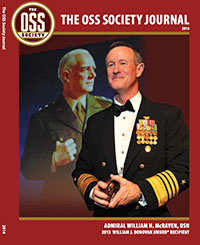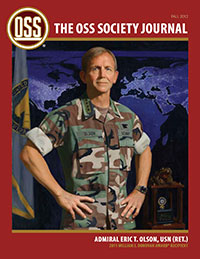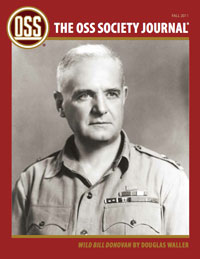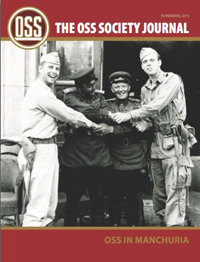Glorious Amateurs: A New OSS
January 2008 Author:Charles Pinck | Dan Pinck
Since 9/11 and the wars in Afghanistan and Iraq, occasional proposals have been made to re-create the OSS, an ad hoc intelligence organization created by President Franklin D. Roosevelt and led by Major General William "Wild Bill" Donovan that holds a special place in the history of intelligence.
Its mission was twofold: first, to provide the President with timely, comprehensive and coordinated intelligence and analysis that he failed to receive from any single government intelligence agency or department, including the military, the State Department, and the Federal Bureau of Investigation. Secondly, the President wanted to have an independent group that would engage in clandestine and covert actions on many fronts patterned after Britain's Special Operations Executive (SOE), which Winston Churchill directed to "set Europe ablaze."
The OSS had an outstanding record in its secret war. It was so successful that four months after end of the war and six months after Roosevelt's death, the generals and admirals, the State and War Departments, and the FBI conspired to persuade President Truman to disband the organization, which he did, on October 1, 1945.
Consequently, the US did not have an effective intelligence agency during the start of the Cold War. Two years later, Truman realized that he needed the peacetime intelligence agency that Donovan had proposed in 1944 and had, in fact, named the Central Intelligence Agency. On September 18, 1947, Truman signed the National Security Act, creating the CIA. (SOCOM, the US Special Operations Command, also traces its lineage to the OSS.)
Spying is generally an anathema to Americans, especially since some distasteful events have been exposed or revealed during the past sixty years or more. For many reasons, we seemingly have an inbred aversion to clandestine activities. When a secret service's work is not secret, we no longer have a secret service. Or at least a service that has the potentiality of accomplishing much over a period of time. In our time, the CIA is a handy instrument that functions as a centralized punching bag to blame almost every event that appears to go wrong, from geopolitics to warfare. Our national obsession to heap contumely on the CIA emanates from the White House, Congress, the Defense Department, the State Department, the media and the public. The CIA is no longer the prime and first responder to the President. It now reports to the Director of the National Intelligence, an office with some 1,500 staffers. The CIA has a tough time running its own show. How did the OSS succeed? How would we begin to construct a new OSS today?
The creation of the OSS was itself a small miracle made possible only by the strong support of President Roosevelt and his close personal relationship with General Donovan. Their bipartisan relationship should serve as a role model for today's leaders. (After witnessing Donovan fire a silenced .22 caliber pistol designed by the OSS, Roosevelt famously quipped that Donovan was the only Republican he would allow in the Oval Office with a gun. Bipartisanship has its limits.)
The most striking attributes of the OSS were its leadership, the background of its members, and the fact that the organization reported directly to President Roosevelt. In July 1941, before the US entered World War II, Roosevelt accepted Donovan's plan for a new intelligence organization called the Coordinator of Information (COI), which actually was the name of our first peacetime intelligence organization. The COI was a civilian group that reported to the President. After we entered the war, Roosevelt signed a military order on June 13, 1942 establishing the OSS and appointing Donovan as its director. On paper, the OSS was placed under the direction of the Joint Chiefs, but it still had President Roosevelt's ear. A new OSS would need the same independence and presidential support in order to succeed.
Donovan was unconventional, fearless, visionary, imaginative, willing to take the same risks that he asked of others. He took personal responsibility for mistakes. He frequently told OSS personnel that they couldn't succeed without taking chances. He had a facility at selecting and recruiting men and women some of whom reflected his traits. His primary concern was in making OSS an effective force to defeat the enemy. He was renowned for never rejecting any idea of out hand. He built the OSS in his own image, a potent combination of brain, brawn and bravado. In his farewell address, Donovan described the OSS as an "unusual experiment."
OSS veteran Fisher Howe said it best: "If you define leadership as having a vision for an organization and the ability to attract, motivate, and guide others to fulfill that vision, then you have Bill Donovan in spades."
Bureaucracy was anathema to him and most management practices were distended. His hobby was making organizational charts and never following any of them. He often referred to OSS members as "glorious amateurs" and that is precisely what many of them were. He had a talent for hiring people who were beyond the scope of most military leaders. For example, a young woman from Baltimore, who had served in Europe in a minor diplomatic job before Pearl Harbor, wanted to join the OSS and volunteered for risky work, despite losing a leg in a horse riding accident. She became an OSS agent and was sent to occupied France twice to work with the Resistance. Virginia Hall would become the only civilian woman to be awarded the Distinguished Service Cross in World War II.
The OSS was a small, nimble organization with slightly more than 13,000 members. More than sixty percent of its personnel were seconded from the Army, Navy, Marines and Coast Guard. About 4,000 were women and 900 of them served overseas. Contrary to popular perception, OSS personnel came from extremely diverse backgrounds, including Jews, African Americans and recent immigrants from many European countries. To Donovan, they were all his glorious amateurs. Few, if any, had an intelligence background. Consider this mixture: classicists, historians, policemen, artists, lawyers, newspaper editors and writers, archeologists, scientists, college presidents, labor leaders, counterfeiters, bankers, movie actors and directors, economists, baseball players, football players, farmers, and yachtsmen.
What do Saul Steinberg, the artist, John Ford, the movie director, Moe Berg, the baseball player who knew twelve languages, Julia Child, Supreme Court Justice Arthur Goldberg, historian and Kennedy aide Arthur Schlesinger, Jr., Carlton S. Coon, the anthropologist, Norman Holmes Pearson, a professor of English, Stewart Alsop, the columnist, Sterling Hayden, an actor, Paul Mellon, a multi-millionaire, Col. Aaron Bank, the founder of the Green Berets, and Ralph Bunche, a foreign affairs specialist who became the Under Secretary-General of the United Nations and the first African American to win the Nobel Peace Prize, have in common? They were all in the OSS.
It's a safe bet that no organization in American history assembled such a dazzling array of talent. Donovan believed that smart, talented and motivated people could accomplish things. They still can.
Special mention must be made about academics who served in OSS. At least 300 faculty members from leading universities joined the OSS and made significant contributions to the organization's Research and Analysis (R&A) unit. Donovan attributed some of OSS's greatest contributions to this group.
A wise leader of a newly-created OSS might be able to recruit a similar group of remarkable people today and unleash their creativity, much like Donovan did.
Senator McCain and Mitt Romney believe that the revival of the OSS is our best chance to defeat terrorism. But where will they find a visionary leader like General Donovan?
During World War II, Donovan said that his greatest enemies were in Washington, not Europe. Could a new OSS sustain its independence from the large number of formidable bureaucracies that sank the original OSS? Let's hope so.
Its mission was twofold: first, to provide the President with timely, comprehensive and coordinated intelligence and analysis that he failed to receive from any single government intelligence agency or department, including the military, the State Department, and the Federal Bureau of Investigation. Secondly, the President wanted to have an independent group that would engage in clandestine and covert actions on many fronts patterned after Britain's Special Operations Executive (SOE), which Winston Churchill directed to "set Europe ablaze."
The OSS had an outstanding record in its secret war. It was so successful that four months after end of the war and six months after Roosevelt's death, the generals and admirals, the State and War Departments, and the FBI conspired to persuade President Truman to disband the organization, which he did, on October 1, 1945.
Consequently, the US did not have an effective intelligence agency during the start of the Cold War. Two years later, Truman realized that he needed the peacetime intelligence agency that Donovan had proposed in 1944 and had, in fact, named the Central Intelligence Agency. On September 18, 1947, Truman signed the National Security Act, creating the CIA. (SOCOM, the US Special Operations Command, also traces its lineage to the OSS.)
Spying is generally an anathema to Americans, especially since some distasteful events have been exposed or revealed during the past sixty years or more. For many reasons, we seemingly have an inbred aversion to clandestine activities. When a secret service's work is not secret, we no longer have a secret service. Or at least a service that has the potentiality of accomplishing much over a period of time. In our time, the CIA is a handy instrument that functions as a centralized punching bag to blame almost every event that appears to go wrong, from geopolitics to warfare. Our national obsession to heap contumely on the CIA emanates from the White House, Congress, the Defense Department, the State Department, the media and the public. The CIA is no longer the prime and first responder to the President. It now reports to the Director of the National Intelligence, an office with some 1,500 staffers. The CIA has a tough time running its own show. How did the OSS succeed? How would we begin to construct a new OSS today?
The creation of the OSS was itself a small miracle made possible only by the strong support of President Roosevelt and his close personal relationship with General Donovan. Their bipartisan relationship should serve as a role model for today's leaders. (After witnessing Donovan fire a silenced .22 caliber pistol designed by the OSS, Roosevelt famously quipped that Donovan was the only Republican he would allow in the Oval Office with a gun. Bipartisanship has its limits.)
The most striking attributes of the OSS were its leadership, the background of its members, and the fact that the organization reported directly to President Roosevelt. In July 1941, before the US entered World War II, Roosevelt accepted Donovan's plan for a new intelligence organization called the Coordinator of Information (COI), which actually was the name of our first peacetime intelligence organization. The COI was a civilian group that reported to the President. After we entered the war, Roosevelt signed a military order on June 13, 1942 establishing the OSS and appointing Donovan as its director. On paper, the OSS was placed under the direction of the Joint Chiefs, but it still had President Roosevelt's ear. A new OSS would need the same independence and presidential support in order to succeed.
Donovan was unconventional, fearless, visionary, imaginative, willing to take the same risks that he asked of others. He took personal responsibility for mistakes. He frequently told OSS personnel that they couldn't succeed without taking chances. He had a facility at selecting and recruiting men and women some of whom reflected his traits. His primary concern was in making OSS an effective force to defeat the enemy. He was renowned for never rejecting any idea of out hand. He built the OSS in his own image, a potent combination of brain, brawn and bravado. In his farewell address, Donovan described the OSS as an "unusual experiment."
OSS veteran Fisher Howe said it best: "If you define leadership as having a vision for an organization and the ability to attract, motivate, and guide others to fulfill that vision, then you have Bill Donovan in spades."
Bureaucracy was anathema to him and most management practices were distended. His hobby was making organizational charts and never following any of them. He often referred to OSS members as "glorious amateurs" and that is precisely what many of them were. He had a talent for hiring people who were beyond the scope of most military leaders. For example, a young woman from Baltimore, who had served in Europe in a minor diplomatic job before Pearl Harbor, wanted to join the OSS and volunteered for risky work, despite losing a leg in a horse riding accident. She became an OSS agent and was sent to occupied France twice to work with the Resistance. Virginia Hall would become the only civilian woman to be awarded the Distinguished Service Cross in World War II.
The OSS was a small, nimble organization with slightly more than 13,000 members. More than sixty percent of its personnel were seconded from the Army, Navy, Marines and Coast Guard. About 4,000 were women and 900 of them served overseas. Contrary to popular perception, OSS personnel came from extremely diverse backgrounds, including Jews, African Americans and recent immigrants from many European countries. To Donovan, they were all his glorious amateurs. Few, if any, had an intelligence background. Consider this mixture: classicists, historians, policemen, artists, lawyers, newspaper editors and writers, archeologists, scientists, college presidents, labor leaders, counterfeiters, bankers, movie actors and directors, economists, baseball players, football players, farmers, and yachtsmen.
What do Saul Steinberg, the artist, John Ford, the movie director, Moe Berg, the baseball player who knew twelve languages, Julia Child, Supreme Court Justice Arthur Goldberg, historian and Kennedy aide Arthur Schlesinger, Jr., Carlton S. Coon, the anthropologist, Norman Holmes Pearson, a professor of English, Stewart Alsop, the columnist, Sterling Hayden, an actor, Paul Mellon, a multi-millionaire, Col. Aaron Bank, the founder of the Green Berets, and Ralph Bunche, a foreign affairs specialist who became the Under Secretary-General of the United Nations and the first African American to win the Nobel Peace Prize, have in common? They were all in the OSS.
It's a safe bet that no organization in American history assembled such a dazzling array of talent. Donovan believed that smart, talented and motivated people could accomplish things. They still can.
Special mention must be made about academics who served in OSS. At least 300 faculty members from leading universities joined the OSS and made significant contributions to the organization's Research and Analysis (R&A) unit. Donovan attributed some of OSS's greatest contributions to this group.
A wise leader of a newly-created OSS might be able to recruit a similar group of remarkable people today and unleash their creativity, much like Donovan did.
Senator McCain and Mitt Romney believe that the revival of the OSS is our best chance to defeat terrorism. But where will they find a visionary leader like General Donovan?
During World War II, Donovan said that his greatest enemies were in Washington, not Europe. Could a new OSS sustain its independence from the large number of formidable bureaucracies that sank the original OSS? Let's hope so.







